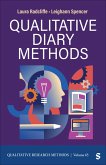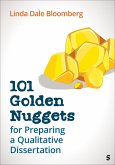- Broschiertes Buch
- Merkliste
- Auf die Merkliste
- Bewerten Bewerten
- Teilen
- Produkt teilen
- Produkterinnerung
- Produkterinnerung
This method involves research participants listing what they know or think about the researcher's topic. This book incorporates free-list analyses with other analytical methods and demonstrates their broad applicability. The book starts with descriptive methods, then outlines a predictive statistical framework. The author explains how to collect, clean, and manage free-list data and how to use R to calculate and visualize them.
Andere Kunden interessierten sich auch für
![Modeling Nonlinearity and Interaction in Regression Analysis Using Spline Variables Modeling Nonlinearity and Interaction in Regression Analysis Using Spline Variables]() Roger A. WojtkiewiczModeling Nonlinearity and Interaction in Regression Analysis Using Spline Variables42,99 €
Roger A. WojtkiewiczModeling Nonlinearity and Interaction in Regression Analysis Using Spline Variables42,99 €![Rasch Models for Solving Measurement Problems Rasch Models for Solving Measurement Problems]() Engelhard, George, Jr.Rasch Models for Solving Measurement Problems55,99 €
Engelhard, George, Jr.Rasch Models for Solving Measurement Problems55,99 €![Qualitative Diary Methods Qualitative Diary Methods]() Laura RadcliffeQualitative Diary Methods42,99 €
Laura RadcliffeQualitative Diary Methods42,99 €![101 Golden Nuggets for Preparing a Qualitative Dissertation 101 Golden Nuggets for Preparing a Qualitative Dissertation]() Linda Dale Bloomberg101 Golden Nuggets for Preparing a Qualitative Dissertation39,99 €
Linda Dale Bloomberg101 Golden Nuggets for Preparing a Qualitative Dissertation39,99 €![Designing Small Evaluation Studies Designing Small Evaluation Studies]() Larry V. HedgesDesigning Small Evaluation Studies68,99 €
Larry V. HedgesDesigning Small Evaluation Studies68,99 €![Single-Case Designs for Applied Research Single-Case Designs for Applied Research]() Craig H. KennedySingle-Case Designs for Applied Research94,99 €
Craig H. KennedySingle-Case Designs for Applied Research94,99 €![Mixed Methods Research Outside the Box Mixed Methods Research Outside the Box]() Joseph A. MaxwellMixed Methods Research Outside the Box68,99 €
Joseph A. MaxwellMixed Methods Research Outside the Box68,99 €-
-
-
This method involves research participants listing what they know or think about the researcher's topic. This book incorporates free-list analyses with other analytical methods and demonstrates their broad applicability. The book starts with descriptive methods, then outlines a predictive statistical framework. The author explains how to collect, clean, and manage free-list data and how to use R to calculate and visualize them.
Produktdetails
- Produktdetails
- Quantitative Applications in the Social Sciences
- Verlag: Sage Publications Inc Ebooks
- Seitenzahl: 200
- Erscheinungstermin: 12. Mai 2025
- Englisch
- Abmessung: 212mm x 136mm x 12mm
- Gewicht: 292g
- ISBN-13: 9781071918425
- ISBN-10: 1071918427
- Artikelnr.: 73333399
- Herstellerkennzeichnung
- Libri GmbH
- Europaallee 1
- 36244 Bad Hersfeld
- gpsr@libri.de
- Quantitative Applications in the Social Sciences
- Verlag: Sage Publications Inc Ebooks
- Seitenzahl: 200
- Erscheinungstermin: 12. Mai 2025
- Englisch
- Abmessung: 212mm x 136mm x 12mm
- Gewicht: 292g
- ISBN-13: 9781071918425
- ISBN-10: 1071918427
- Artikelnr.: 73333399
- Herstellerkennzeichnung
- Libri GmbH
- Europaallee 1
- 36244 Bad Hersfeld
- gpsr@libri.de
Benjamin Grant Purzycki is Associate Professor at Aarhus University's Department of the Study of Religion. A cognitive and evolutionary anthropologist by training, he merges experimental and ethnographic methods together to make better sense of religious systems' utility for human adaptation. He has conducted fieldwork in the Tyva Republic (Russia) and managed large cross-cultural projects. He co-developed AnthroTools (with Alastair Jamieson-Lane), a software package for analyzing ethnographic data in R and has published in a wide range of journals including Current Anthropology, Cognition, Cognitive Science, Nature, Proceedings of the Royal Society B, and Psychological Methods. His books include Religion Evolving: Cultural, Cognitive, and Ecological Dynamics (with Richard Sosis, Equinox), The Minds of Gods: New Horizons in the Naturalistic Study of Religion (with Theiss Bendixen, Bloomsbury), the two-volume Evolution of Religion and Morality project (with Martin Lang, Joseph Henrich, and Ara Norenzayan, Routledge), and Morality and the Gods (Cambridge University Press).
Series Editor Introduction
Preface
Acknowledgments
About the Author
Chapter 1: Introduction
What Is a Free-List?
Why Free-List?
Getting to Work
Data Management
Chapter 2: Content Analysis
Background
Frequency Analysis
Salience Analysis
Salience Revisited
Further Methods in Content Analysis
Summary
Chapter 3: Structure Analysis
Examining Conceptual Relationships
Two Case Studies
Conceptual Networks
Further Methods in Structure Analysis
Chapter 4: Overlap and Sharedness
Conceptual Overlap Across Domains
Intragroup Sharing and Variation
Intergroup Sharing and Variation
Summary and Closing Note
Chapter 5: Models, Prediction, and Uncertainty
The Arithmetic Mean as a Model
Primer on Regression
Bayesian Regression
Chapter 6: Free-List Data in Regression
Thinking Through the System
Predicting List Lengths
Predicting Item Presence
Predicting Salience
Multilevel Models
Using Individual Free-Lists to Predict Behavior
Concluding Remarks
Chapter 7: Future Prospects
Culture, Text, and Content
Cognition, Culture, and Society
Culture Evolving
References
Index
Preface
Acknowledgments
About the Author
Chapter 1: Introduction
What Is a Free-List?
Why Free-List?
Getting to Work
Data Management
Chapter 2: Content Analysis
Background
Frequency Analysis
Salience Analysis
Salience Revisited
Further Methods in Content Analysis
Summary
Chapter 3: Structure Analysis
Examining Conceptual Relationships
Two Case Studies
Conceptual Networks
Further Methods in Structure Analysis
Chapter 4: Overlap and Sharedness
Conceptual Overlap Across Domains
Intragroup Sharing and Variation
Intergroup Sharing and Variation
Summary and Closing Note
Chapter 5: Models, Prediction, and Uncertainty
The Arithmetic Mean as a Model
Primer on Regression
Bayesian Regression
Chapter 6: Free-List Data in Regression
Thinking Through the System
Predicting List Lengths
Predicting Item Presence
Predicting Salience
Multilevel Models
Using Individual Free-Lists to Predict Behavior
Concluding Remarks
Chapter 7: Future Prospects
Culture, Text, and Content
Cognition, Culture, and Society
Culture Evolving
References
Index
Series Editor Introduction
Preface
Acknowledgments
About the Author
Chapter 1: Introduction
What Is a Free-List?
Why Free-List?
Getting to Work
Data Management
Chapter 2: Content Analysis
Background
Frequency Analysis
Salience Analysis
Salience Revisited
Further Methods in Content Analysis
Summary
Chapter 3: Structure Analysis
Examining Conceptual Relationships
Two Case Studies
Conceptual Networks
Further Methods in Structure Analysis
Chapter 4: Overlap and Sharedness
Conceptual Overlap Across Domains
Intragroup Sharing and Variation
Intergroup Sharing and Variation
Summary and Closing Note
Chapter 5: Models, Prediction, and Uncertainty
The Arithmetic Mean as a Model
Primer on Regression
Bayesian Regression
Chapter 6: Free-List Data in Regression
Thinking Through the System
Predicting List Lengths
Predicting Item Presence
Predicting Salience
Multilevel Models
Using Individual Free-Lists to Predict Behavior
Concluding Remarks
Chapter 7: Future Prospects
Culture, Text, and Content
Cognition, Culture, and Society
Culture Evolving
References
Index
Preface
Acknowledgments
About the Author
Chapter 1: Introduction
What Is a Free-List?
Why Free-List?
Getting to Work
Data Management
Chapter 2: Content Analysis
Background
Frequency Analysis
Salience Analysis
Salience Revisited
Further Methods in Content Analysis
Summary
Chapter 3: Structure Analysis
Examining Conceptual Relationships
Two Case Studies
Conceptual Networks
Further Methods in Structure Analysis
Chapter 4: Overlap and Sharedness
Conceptual Overlap Across Domains
Intragroup Sharing and Variation
Intergroup Sharing and Variation
Summary and Closing Note
Chapter 5: Models, Prediction, and Uncertainty
The Arithmetic Mean as a Model
Primer on Regression
Bayesian Regression
Chapter 6: Free-List Data in Regression
Thinking Through the System
Predicting List Lengths
Predicting Item Presence
Predicting Salience
Multilevel Models
Using Individual Free-Lists to Predict Behavior
Concluding Remarks
Chapter 7: Future Prospects
Culture, Text, and Content
Cognition, Culture, and Society
Culture Evolving
References
Index








